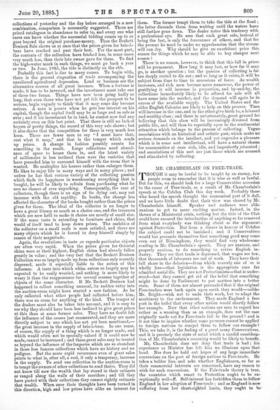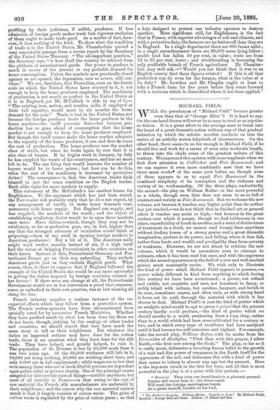MR. CHAMBERLAIN ON FREE-TRADE.
THOUGH it may be lawful to be taught by an enemy, few people seem to remember that it is wise as well as lawful. But for this, we should look for a large Conservative accession to the cause of Free-trade, as a result of Mr. Chamberlain'e, speech at the Cobden Club this day week. Probably those. who heard the speech thought the economical part of it dull, and we have little doubt that their view was shared by Mr.
Chamberlain himself. Speaker and audience were alike anxious to get to more exciting matter. Indeed, in the throes of a Ministerial crisis, nothing but the title of the Club could have ensured the introduction of anything so far removed. from what everybody was thinking about as the argument.. against Protection. But from a dinner in honour of Cobden the subject could not be banished ; and if Conservatives would but persuade themselves that something good may come even out of Birmingham, they would find very wholesome. reading in Mr. Chamberlain's speech. They are anxious, and properly anxious, to do something to revive English industry. They see that trade is depressed, that wages are low,. that thousands of labourers are out of work. They have their full share in the delusion—from which scarcely one of us is wholly free—that legislation is the appropriate cure for admitted social ills. They are not Protectionists—that is understood—but they cannot get rid of the belief that something might be done by Parliament to put matters into a better state. Some of them are almost persuaded that if the original Free-traders were back again upon earth they would—unlike Mr. Bright—wish not to undo their work, but to adapt the machinery to the environment. They made England a free port in the belief that every other nation would shortly follow her example. Now that other nations are seen to regard her rather as a warning than as an example, does not the case originally made out for Free-trade fall to the ground ? and is it not time to inquire whether some pressure cannot be applied to foreign nations to compel them to follow our example I This, we take it, is the feeling of a great many Conservatives, and it is precisely the state of mind which a candid consideration of Mr. Chamberlain's reasoning would be likely to benefit..
Mr. Chamberlain does not deny that trade is bad ; his experience as Minister has left him no illusions upon that.head. Nor does he hold out hopes of any large immediate conversions on the part of foreign nations to Free-trade. He, takes a bolder line, and asks whether Englishmen, so far as their commercial interests are concerned, have any reason to wish for such conversions. If the Fair-trade theory is true, the countries which resort to Protection ought to be exceptionally well-off. Self-interest has forbidden them to follow England in her adoption of Free-trade ; and as England is now suffering from her short-sighted haste, they ought to her profiting by their judicious, if selfish, prudence. If free admission of foreign goods makes trade bad, rigorous exclusion of them ought to make trade good. As a matter of fact, however, it does nothing of the kind. To show what the condition of trade is in the United States, Mr. Chamberlain quoted a very remarkable passage from a recent report by the Secretary of the United States Treasury. "The all-important question," the Secretary says, "is how shall the country be relieved from the plethora of manufactured goods. Our power to produce is much in excess of the present or any probable demand for home consumption. Unless the markets now practically closed against us are opened, the depression, now so severe, will continue." We see, therefore, that Protection, even on the heroic scale on which the United States have resorted to it, is not enough to keep the home producer employed. The machinery of production is not nearly so perfect in the United States as it is in England, yet Mr. M'Culloch is able to say of it,— " The existing iron, eotton, and woollen mills, if employed at their full capacity, would meet in six months the home demand for the year." Trade is bad in the United States, not because the foreign producer beats the home producer in the home market—the tariff prevents that—but because production has so gone ahead of consumption that the home market is not enough to keep the home producer employed. But though the tariff cannot make the home market adequate to the capacity of the home producer, it can and does in rease the cost of production. The home producer sees the market clear of rivals, but when he looks again he sees that it is also clear of buyers. If he begins work in January, by July he has supplied the wants of his countrymen, and has no more left to do. The one thing that would increase the number of buyers would be to lower prices ; but how can he do this, when the cost of his machinery is increased by protective duties? The consequence is, that the American trader finds himself in just the same condition as the English trader. Each alike sighs for more markets to supply.
This statement of Mr. McCulloch's has another lesson for Englishmen. To the argument which has just been stated, the Fair-trader will probably reply that he does not expect, by any arrangement of tariffs, to make home demands commensurate with home supply. But England can supply, and has supplied, the markets of the world ; and the object of establishing retaliatory duties would be to open those markets once more. Have duties,—which, though they may not be retaliatory, so far as profession goes, are, in fact, higher than any that the strongest advocate of retaliation would think of proposing,—been of any avail in opening foreign markets to American producers ? Not a bit of it. The American mills might work twelve months instead of six, if a high tariff had the virtue of bringing Protectionists in other countries on their knees. Instead of this, Protectionist Germany and Protectionist France go on their way unheeding. They exclude American goods just as they exclude English goods. What reason, then, is there to suppose that if England followed the example of the United States she would be any more successful in getting the duties imposed by foreign countries relaxed in her favour ? If there were any change at all, the Protectionist Government would see in her conversion a proof that commonsense, as embodied in their own practice, was at last winning all along the line.
French industry supplies a curious instance of the unexpected effects which may follow from a protective system. The French cotton-spinners have from circumstances been specially cared for by successive French Ministries. Whether they have profited much by what has been done for them we do not know, though, judging by the analogy of other trades and countries, we should expect that they have much the same story to tell as their neighbours. But whatever the duties on imported cottons may have done for the cotton trade, there is no question what they have done for the silk trade. They have helped, and greatly helped, to ruin it. The population of St. Etienne is less by 25,000 souls than it was two years ago. Of the 66,000 workmen still left in it, 10,000 are doing nothing, 50,000 are working short time, and only 6,000 are in full employment ; while wages are so low that even among those who are at work 30,000 persons are dependent upon public relief or private charity. One of the principal causes assigned for this terrible state of things—terrible anywhere, but most of all terrible in France—is that owing to the cost of raw material the French silk manufacturers are undersold by their neighbours ; and the reason why the raw material costs so much is that it largely consists of cotton waste. The price of cotton waste is regulated by the price of cotton yarns ; so that a duty designed to protect one industry operates to destroy another. More significant still, for Englishmen, is the fact that in France, with superior advantages of soil and climate, and with a protective duty, the farmers are no better-off than they are in England. In a single department there are 800 farms unlet ; in a single arrondissement there are 20,000 acres lying fallow ; arable land has fallen 50 per cent, in value ; rents are from 12 to 33 per cent. lower ; and stockbreeding is becoming the only profitable branch of French agriculture. Mr. Chamberlain may well ask,—" Would you not think that it was to an English county that these figures related ? If this is all that protection can do even for the farmer, what is the value of a 5s. duty ? Mr. Lowther and Mr. Chaplin ought at least to take a French farm for five years before they come forward with a nostrum which is discredited where it has been applied."



































 Previous page
Previous page